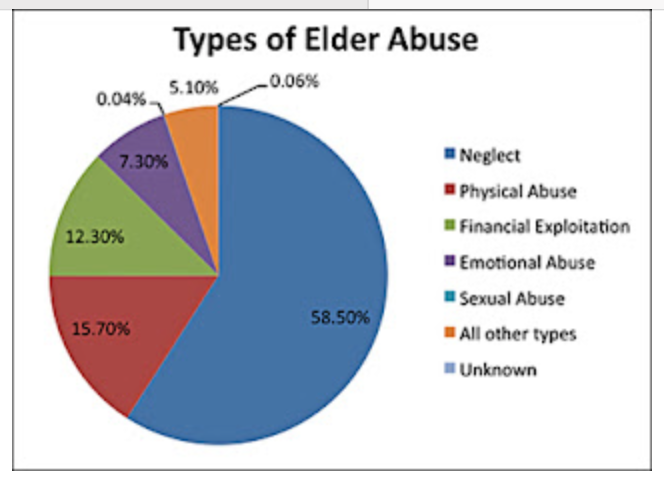Elder Abuse
Statistics on elder abuse are ghastly and frightening for those of us who must leave the care of our loved ones in someone else’s hands. Whether the abuser is a family member or a paid provider, it’s equally horrifying. So how do you know? Below you’ll find a partial checklist of things to look for based on a comprehensive article on nursing home abuse written by Levin & Perconti law firm, in Chicago, Illinois. [312-332-2872 – https://www.levinperconti.com]. Here’s a link to the article: https://www.levinperconti.com/nursing-home-abuse/. This is not a complete list and some signs may indicate medical and emotional causes not related to abuse but any sudden changes or new signs may be a signal that an investigation is needed. Follow your gut.
Physical Abuse
Anything that deprives someone of their primary needs for survival and dignity would be considered physical abuse.
Keep an eye out for the following:
- Unsanitary conditions that could breed infections (Check toilet area, bedding, linens, clothing.)
- Physical neglect (Is someone there with your caree when you visit? Do the staff know your caree’s name?)
- Physical abuse (Watch for scars, bruises, rashes, broken bones, scrapes. Notice scared eyes and cowering when staff comes near.)
- Misuse of restraints (Rub burns or scars on wrists or ankles especially.)
- Muscle fatigue, aching back or stiff bones from being left in one position for too long or not being taken for exercise.
- Bed sores from not being moved into different positions during the day if bed-bound.
- Unusual weight gain or loss
- Poor skin pallor
- Confusion
- Broken eyeglasses or hearing aides, torn clothing, unclean water glass
- Walker, canes misplaced or needing repair
Emotional Abuse
Non-physical actions like verbal abuse and any action that deprives someone of their dignity are considered emotional abuse. Sometimes this is done in retribution by a caregiver who is harboring resentment or feels justified because of how they are being paid (not paid) or treated. Exhaustion from overwork due to staffing shortages can also cause people to be short tempered and easy to agitate. Notice the mood and attitude of the people surrounding your loved one.
Watch for the following:
- Insults
- Harassment
- Someone laughing at or ridiculing your loved one
- Yelling
- Threats
- Leaving someone in soiled clothing or bedding
- Refusing to allow the person to make their own choices
- Bullying
Neglect
Neglect refers to a caretaker’s failure to provide food, shelter, medical care, or protection. Signs of general and medical neglect include:
- Bedsores
- Infections
- Sepsis
- MRSA
- Dehydration
- Choking
- Clogged Breathing Tubes
- Clogged Catheter
- Recurring Urinary Tract Infections (UTI)
- Malnutrition (weight loss, fatigue, white fingernails, bedsores, etc.)
- Fractures (from falls because no one was there to help someone out of bed or chair)
- Incorrect medication administration (expired, wrong dose, given at wrong time)
Sexual Abuse
Sexual abuse is any non-consensual sexual contact. When people cannot voice their thoughts and/or cannot push someone away or call for help, sexual abuse can happen. Signs to watch out for include:
- Bruises
- Bruises around breasts or genital area
- Unexplained Sexually Transmitted Disease (STD)
- Fear and withdrawal when a particular person enters the room or comes near
- Sudden or new withdrawal within
- Sudden faraway look (escaping in mind)
Fiscal/Financial Exploitation
Financial exploitation refers to the illegal taking, misuse, or concealment of funds or property. Older people, particularly those with dementia or cognitive decline, are particularly susceptible to financial fraud, and criminals know this. Certain family members may take it upon themselves to get part of their perceived “inheritance” early. Sad but true. This happens all too frequently.
Keep an inventory of everything and check it regularly. Make note of who has been around. Using cameras at all entrances and exits of an elder’s home will help with identifying potential suspects. Log sheets of visitors are helpful when living in an elder community or confined to a care facility. When someone begins to lose their memory or ability to communicate or be aware of surroundings, put their valuables and keepsakes in a safe or locked storage area to ensure nothing goes missing.
Keep an eye out for the following:
- Missing checks, stocks, bonds, certificates, etc.
- Missing cash.
- Missing jewelry or valuables.
- Things disappearing from the room or house.
- Money missing from bank accounts.
- Unusual level of activity on bank accounts or credit cards.
- Large purchases made on credit cards.
- New vendors working around the home with no adherence to a quote or estimate.
- Contracts with loopholes that benefit a contractor and take advantage of the trusting customer.
- Changes to a will or power of attorney or health care proxy without cause.
- Fraudulent signatures on documents
- Contracts for things that aren’t needed
- Agreements made with someone on the phone or internet without meeting them.
If you have questions about something you’re seeing that feels off, investigate. Find out first if there’s a change in your loved one’s health status causing the changes you’re seeing. If not, then investigate to see if someone is harming your loved one. If you determine there’s a problem, reach out to an elder law attorney or social work agency or Area Agency on Aging in your community for help.
Graph courtesy of: lehighvalleyramblings.blogspot.com

